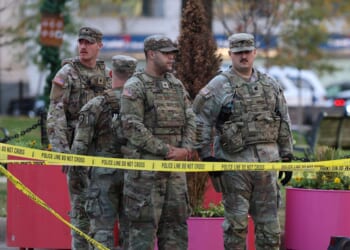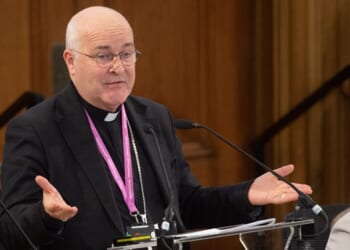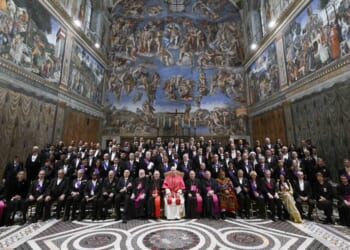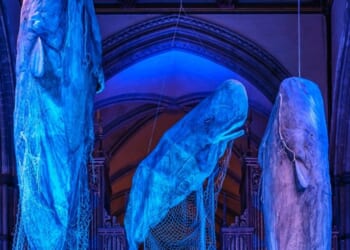(LifeSiteNews) —Taking young men who live on autopilot and transforming them into men fully alive and on fire for their life’s purpose: This is the grand mission of Sebaste, one of the few existing apostolates that tackles the masculinity crisis at its roots.
Speaking to Sebaste co-founder Johnny Kuplack, it’s clear that he was made for the mission of inspiring young men to fulfill their calling and ultimately become great saints. Listening to him contrast a typical life with the life we are meant to aspire to feels like having one’s eyes opened to a new dimension of existence, or seeing in full color after living in black and white.
But Kuplack walks the walk, too. A fervent Catholic, he has devoted much of his life to teaching and mentoring young men. This has culminated in Sebaste, which centers around a 10-week mentorship experience for young men in which they detox from the world and immerse themselves in prayer, adventure, and physical challenge while forming brotherly bonds.
Learn more about Sebaste at www.sebaste.org, and consider supporting its mission by donating here.
The mentor and athlete has also pushed himself to meet awe-inspiring challenges, like completing 100 ultra-marathons in 100 days to cross the country, from the coast of California to New York. Most recently, he completed a 214-mile beast of a marathon through the Sierra mountains, aptly named “Mammoth.” It is over twice the length of the longest marathon he completed before Mammoth — 106 miles.
“It was extremely challenging,” he told LifeSiteNews. “You go through the whole spectrum of human emotions. It’s a microcosm of life: You begin the race and there’s excitement, because you’re not feeling the pain yet. For the first 30 miles it’s fun, then you start to feel it … as the sun sets on the first day, different voices start coming up in your heart and your head.”
“Things get hard and you get tired —‘Why am I doing this?’ I don’t feel good … everything inside me is saying stop or slow down or walk this section, and that only intensifies,” Kuplack said. He told how while he ranked among the first five runners in the first 70 miles, he made a pivotal mistake by failing to put on his warm gear after it got really cold and running 28 miles without eating or drinking.
“You gotta keep drinking and eating, that’s the death of Ultra Runner. The best eater usually does the best,” Kuplack said. By the time he ran up to one of his pit stops, he was “hypothermic.”
“I spent 30 minutes wrapped in a blanket. I couldn’t move my fingers, I kind of staggered out of there,” he said, adding that he spent the next 100-plus miles “paying” for his mistakes. “It’s so much like life,” he noted.
“It was really bad. For the next 50 miles it was a total slog.” Kuplack had gone beyond the point of hurting to not being able to move properly. “It ceased to be about the competition, it became almost survival.” He was determined to finish — dropping out was not an option.
Unexpectedly, at about mile 160, one of Kuplack’s good friends, a priest, came to pace him, running and shuffling with him “all night into the next day.” At the second sunrise, Kuplack “ate a ton of food and slept for an hour.” He woke up to find his legs were working again.
“I just crushed the next 40 miles. It was miraculous. I moved way up in the standings. There was so much joy in the ability to move freely again. I was flying up mountains.”
“The whole thing is a meditation on the fragility of our lives,” he remarked, pointing out that just as he couldn’t have finished the race without a crew, we need people in our life to support us when we get worn down.
Kuplack also made a point of reframing his setback during the race, “flipping the script” from asking, “God, why did this happen?” to “God, what do you want to teach me?”
“If I won, my ego would have felt really good. But that’s not what happened. I was running with my ego leading, that’s the worst way to run. Then all of a sudden your ego is obliterated,” said Kuplack, stressing that he was forced to rely on God’s help to persevere in the race.
“That experience is so much more valuable to me than if I had won the race. I’m so grateful for that. This is the experience you wanted me to have. This is actually going to help me become the great saint I’m made to be.” He went on to add, “One of the things I really appreciate about this race is that it was another chance for me to get humility. This is the truth about me. I want to live out the truth, not some weird fantasy I have about myself and how awesome I am.”
Kuplack hopes that his endurance challenges will inspire other men to do great things in their own lives.
“Especially young men, but all of us, we all desire to know, ‘What am I made of? What am I really capable of? It can only be answered when you get into the arena. It can’t be answered on the couch. It can only be answered when you step out of your comfort zone and you embark on the adventure that God has laid out for you. In that adventure, like all good adventures, there’s trials, there’s great joys, there’s great beauty. There’s also struggles, there’s sadness, there’s loss.”
Kuplack says so many young men today live sedated lives with stifled visions and need to have a desire for adventure and greatness reawakened in them.
“There’s a generation of young men that’s grown up in fear, they’ve grown up in fear of discomfort. All they want to do is be comfortable, that’s their primary objective. The greatest thing they can imagine in life is a little house with a white picket fence and 2½ kids and a dog and a brand new car: suburbia. And then you’ve got your TV and all your little creature comforts.”
Children, on the other hand, dream big, he pointed out. They dream of saving people as a firefighter, or accomplishing all kinds of great and “crazy” feats. “But then over time, you ask high school guys — I do this a lot — ‘What are your dreams?’ Most of them can’t even come up with any. How sad is that you ask a 16-year-old ‘What is your dream?’ and they say ‘I don’t know. I don’t have any dreams.’”
“Or their dreams aren’t real dreams. They’re the kind of dreams the culture has made for them or their parents have given to them,” Kuplack said.
“You get one spin around this earth … what is the great adventure and mission God made me for? And in order to go on that mission, I have to be willing to embrace risk,” he continued.
“I want them to be a man alive, a man on fire,” he said of the young men he forms in Sebaste. “The kind of man that, when I’m around him, I’m fired up, I want to go home and live a better life. I’m dreaming different dreams. I’m thinking different thoughts. I want men to be like that.”
He pointed out that so many men have resigned themselves to maintaining the “status quo” and focusing on the appearances of their life, even when it involves Sunday Mass and praying a daily rosary.
“Routine is not enough,” Kuplack said. “How do you breathe life into these things?”
“‘Why don’t I feel different? Is this it?’ Young men are asking this in their hearts. And they’re kind of despairing … They’ve never seen St. Francis go all the way with this radical love for God. They’ve never seen St. Anthony go into the desert and enter into this intense, deep, beautiful life of prayer.”
“It’s not going to look the same for all of us. The main thing we need to focus on is, God has made you for a purpose.” Kuplack says men not only need to know they have a “unique greatness that needs to be pursued” but to know and live from their “identity as a beloved son of God.”
This is the ultimate solution to the dullness of young men’s existence: “We need to make a full-on commitment to knowing Jesus Christ and making eternal salvation the main event in our lives,” he declared. “And make it our main belief that we need to be great saints.”
This is why the core, and foundational task of Sebaste is to help young men “enter into real and right relationship with Jesus Christ.”
“It’s only when we’re living in a real and right relationship with Jesus Christ that we can become men fully alive, and understand the mission for which we were made, and go out on that mission,” he said.
“Identity flows from relationship, and mission flows from identity,” Kuplack noted. “When I know that I’m a beloved son of God the Father, only then can I understand the mission for which I was born. That’s man fully alive. Imagine a generation of young men moving through the world living like that.”
How does Sebaste work?
Kuplack explained that Sebaste is built around intensive programs in which young men gather in New Mexico for 10 weeks with “no more than 20 guys per unit,” so they can form “real relationships” with everyone. They start by turning in all their phones and tech devices.
“It’s a detox from a lot of things in the world: Pop culture, distraction … We remove as many obstacles as we can. We want an environment where they can have an encounter with the living God,” Kuplack said. “Prayer is a huge part of what we do. How do you have a real relationship with the living God? Most guys don’t know how to do that. We can show them the next step.”
The young men go through “intense physical challenges,” and there’s “an immense amount of adventure, and real brotherhood. And there’s a lot of music and poetry,” Kuplack added.
Sebaste will be running multiple intensives, and within the next two years will be opening up an intensive in New Mexico for young men right out of high school called “A Year Well Spent,” the equivalent of an academic year.
Sebaste also runs retreats for men who have been through the intensive program, and offers sustained transformation coaching through Zoom calls once a week or once or twice a month — to help guys continue growing on the path of holiness and greatness.
Learn more about Sebaste at www.sebaste.org, and consider supporting its mission by donating here.

















